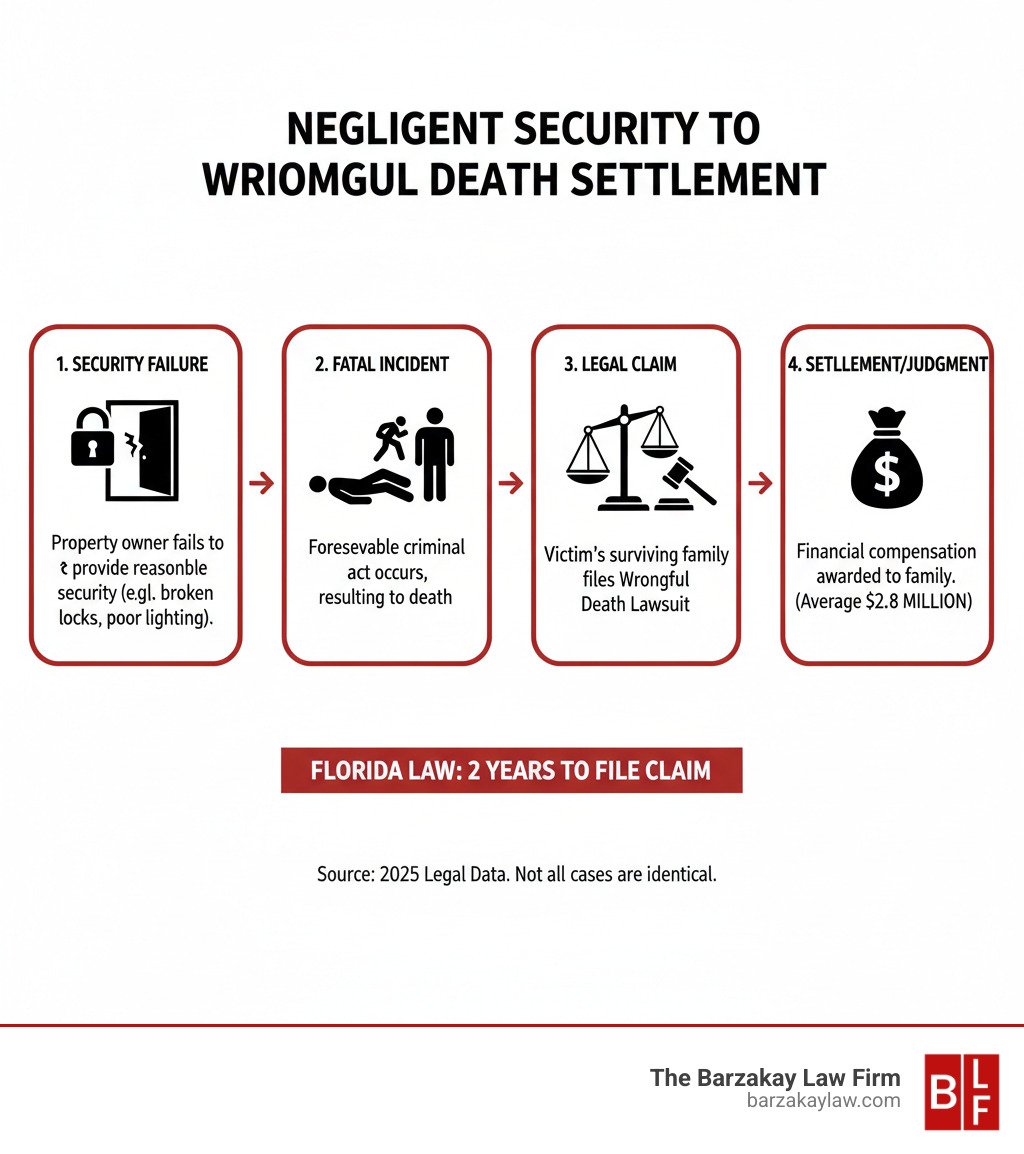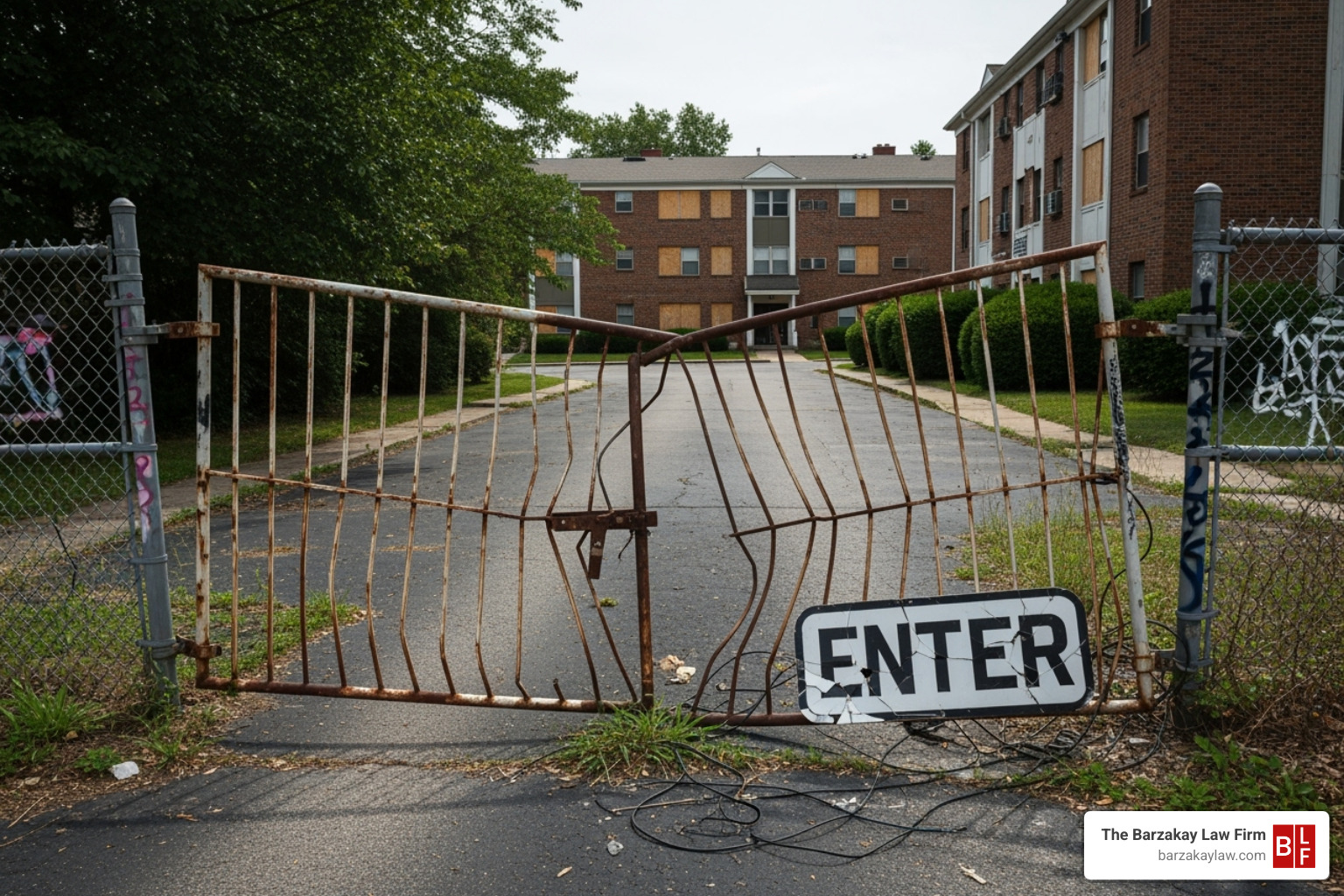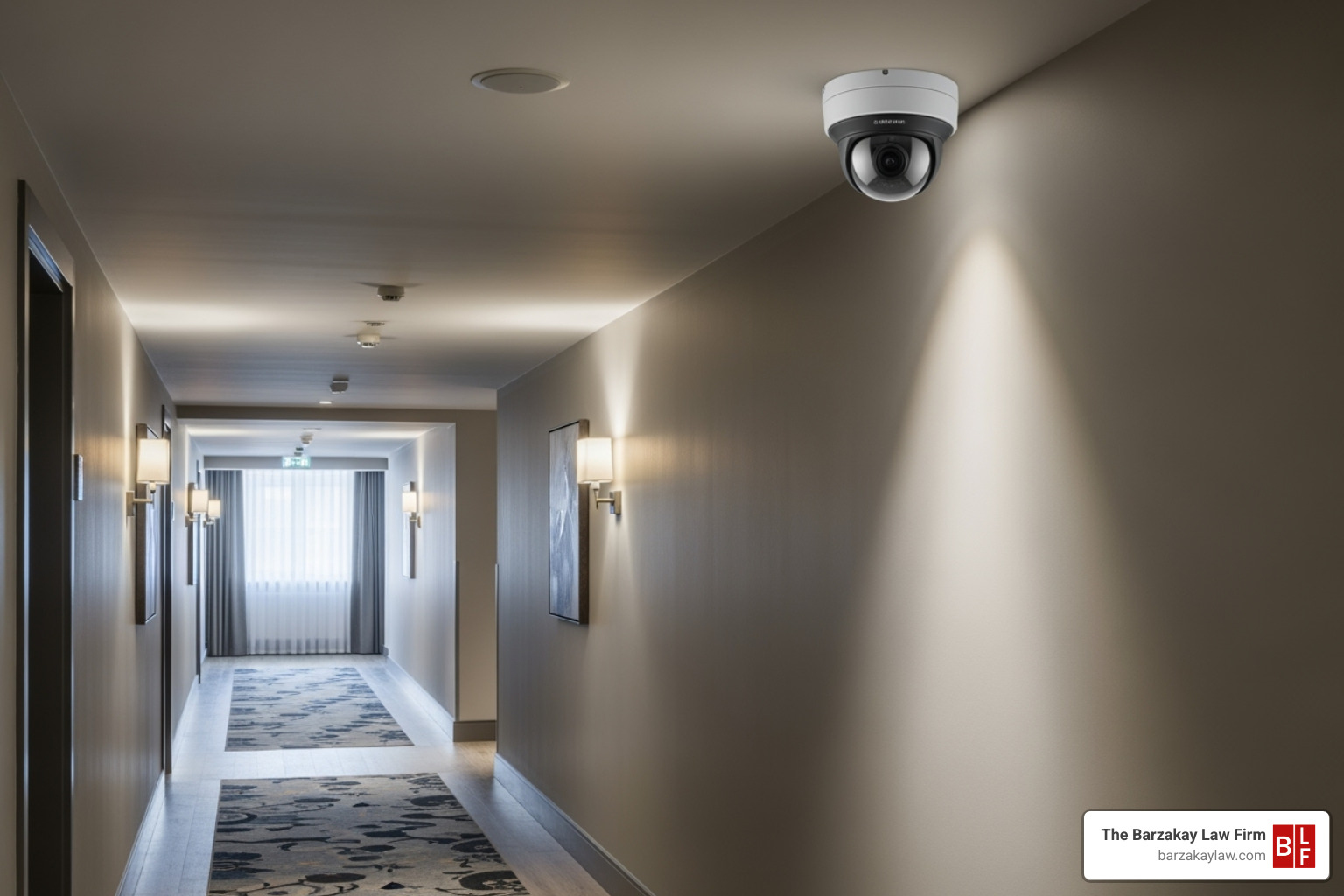Understanding When Negligent Security Becomes a Wrongful Death Case
When a loved one dies due to inadequate security, families often wonder is negligent security settlement considered a wrongful death. The answer is yes. When a death occurs because a property owner failed to provide reasonable security, a personal injury claim becomes a wrongful death lawsuit.
Key Points:
- Yes, negligent security can result in wrongful death claims when the victim dies
- Surviving family members can file the lawsuit instead of the victim
- Property owners have a legal duty to protect visitors from foreseeable crimes
- Settlements average $2.8 million for wrongful death cases according to recent data
- Florida law allows two years from the date of death to file a claim
Security failures at South Florida properties like apartments, hotels, and parking lots lead to preventable deaths. Owners who ignore risks like broken locks, poor lighting, or known crime in the area can be held responsible for the deadly consequences.
These cases are complex, requiring proof that the property owner knew or should have known that inadequate security could lead to harm. Unlike a typical car accident case, a negligent security claim requires showing the death was a foreseeable result of the owner’s failure to act.
For families in Miami, Hollywood, and Boca Raton dealing with this loss, understanding your legal rights is the first step toward justice.
What is the Link Between Negligent Security and Wrongful Death?
The link between negligent security and wrongful death is direct: when a property owner’s failure to provide reasonable safety leads to a death, it becomes a wrongful death claim. Understanding this is crucial for grieving families seeking justice.
Property owners have a legal “duty of care” to protect visitors from foreseeable dangers, including crimes. Ignoring broken cameras, faulty locks, or known criminal activity is a breach of this duty. If a death results from this negligence, it becomes a wrongful death claim.
The key factor is foreseeability. Could the owner have reasonably predicted that their security failures might lead to harm? For example, if a parking garage with prior robberies still has broken lighting, the risk is foreseeable.
For families in Miami, Hollywood, and Boca Raton, proving this connection requires showing the death was a preventable consequence of the property owner’s failure to act responsibly.
Can a negligent security claim result in a wrongful death lawsuit?
Absolutely. When a death occurs from inadequate security, a personal injury case transforms into a wrongful death claim. The victim’s family members file the claim to address the sudden emotional and financial burdens they face.
Florida law shifts the monetary burden from the grieving family to the negligent party. This is vital in negligent security cases, as these deaths often happen in places expected to be safe, like apartment parking lots or hotels. When basic security fails, the law provides a path for families to seek justice.
The claim then focuses on compensating the family for their losses, including funeral costs and lost financial and emotional support. If you’re facing this situation, understanding your rights under a Negligent Security Lawsuit that has become a wrongful death claim is crucial.
What are the legal elements required to prove a wrongful death claim stemming from negligent security?
Proving a wrongful death claim from negligent security requires establishing four critical elements:
Duty of Care: We must prove the property owner had a legal responsibility to protect the deceased. This duty varies based on the property type, location, and foreseeable dangers.
Breach of Duty: We show the owner failed in their duty, such as by ignoring broken locks or poor lighting. We must prove they knew or should have known about the problem and did nothing.
Causation: We must connect the owner’s security failure directly to the death, showing the tragedy was preventable with proper security. The owner’s negligence must have made the criminal act possible.
Damages: We must prove the family suffered actual losses, including financial costs (funeral, lost income) and emotional losses (loss of companionship).
Successfully proving these elements is the foundation for a wrongful death action in these cases.
What is the role of foreseeability in establishing liability for wrongful death in a negligent security context?
Foreseeability is central to these cases. It asks: Should the property owner have seen this coming? If so, they had a duty to prevent it.
Prior criminal activity on or near the property is strong evidence of foreseeability. Past incidents serve as a clear warning to improve security.
High-crime area designation also establishes foreseeability. Owners in such areas are expected to maintain higher security standards.
The type of business also matters. A 24-hour gas station has different foreseeable risks than an office building. Owners of nightclubs, hotels, and apartments must plan for the specific criminal activity their properties might attract.
The owner’s awareness of risk is compelling evidence. This can be shown through tenant complaints, police reports, or direct requests for better security.
While national crime trends from sources like the Bureau of Justice Statistics (BJS) provide context, they don’t excuse individual property owners. For families in Miami, Hollywood, and Boca Raton, establishing foreseeability often means showing the owner ignored clear warning signs, leading to a preventable tragedy.
How Do Damages and Settlements Work in These Cases?
While no amount of money can replace a loved one, compensation helps families rebuild and holds negligent property owners accountable. Securing fair compensation can be overwhelming, but understanding how it works is an important step.
Is negligent security settlement considered a wrongful death case? Yes, and as a wrongful death case, the settlement focuses on compensating the surviving family members. Negotiations with insurance companies can be lengthy, as they often try to minimize payouts. If a fair settlement isn’t reached, the case may go to a jury. We work to ensure your family’s loss is fully valued.
How do damages differ between a standard negligent security claim and a wrongful death claim related to negligent security?
The key difference is who is compensated and for what losses. In a standard claim, the victim receives compensation. In a wrongful death claim, the focus shifts to the surviving family members.
Here’s how the damages compare:
| Standard Negligent Security Claim | Wrongful Death Claim Related to Negligent Security |
|---|---|
| Victim’s medical bills | Funeral/burial expenses |
| Victim’s lost wages | Survivors’ loss of support and services |
| Victim’s pain and suffering | Survivors’ mental pain and suffering |
| Loss of companionship | |
| Loss of guidance and protection | |
| Medical expenses incurred by the deceased before death |
Wrongful death claims allow families to seek compensation for profound emotional losses, such as the loss of companionship and guidance. These cases also address the financial void by compensating the family for lost earnings and benefits.
What are the typical compensation categories in a wrongful death claim related to negligent security?
Wrongful death settlements cover two main types of losses: economic and non-economic. Understanding these helps families know what to seek.
Economic damages cover measurable financial losses. This includes lost financial support (salary, benefits), medical expenses incurred before death, funeral and burial costs, and the value of lost household services like childcare or home maintenance.
Non-economic damages address intangible but devastating losses. This includes the family’s mental pain and suffering, loss of companionship, and for children, the loss of parental guidance and support.
Our Wrongful Death Lawyers in Florida understand how to properly value these different types of losses to ensure families receive comprehensive compensation.
How does the severity of the victim’s injuries and the property owner’s negligence impact wrongful death settlement amounts in negligent security cases?
In death cases, settlement amounts reflect the permanent loss to the family and the severity of the property owner’s negligence. The owner’s degree of negligence is a major factor. Gross negligence or willfully ignoring obvious dangers typically leads to much higher settlements.
Recent statistics show that wrongful death cases average jury verdicts of $2.8 million, though individual cases vary. For example, a $6 million settlement was reached in a case where inadequate security at a flea market led to a fatal shooting.
Several factors influence settlement amounts:
- Strength of evidence: Clear proof that proper security would have prevented the death leads to higher settlements.
- Victim’s age and earning capacity: This plays a role in calculating economic damages, but the loss of companionship for any victim is a significant factor.
- Location: In places like Miami, Hollywood, and Boca Raton, where security risks are often well-documented, an owner’s failure to act can be seen as more egregious, potentially leading to higher settlements.
Our Miami Wrongful Death Lawyers have the experience to evaluate all these factors and fight for the maximum compensation your family deserves.
Is a Negligent Security Settlement Considered a Wrongful Death Claim in Florida?
Yes, in Florida, when a death results from inadequate security, it is handled as a wrongful death claim. This legal distinction is important for how the case proceeds and the compensation available.
Florida’s wrongful death statute applies when negligence causes a death. If a property owner’s security failure leads to a fatality, the case shifts from personal injury to wrongful death, providing a way for families to seek compensation for their emotional and financial burdens.
In South Florida communities like Miami, Hollywood, and Boca Raton, premises liability and wrongful death laws work together. They hold property owners accountable for failing to protect visitors from devastating harm. Our Florida Wrongful Death Attorney team understands how these state laws apply locally. Florida law is designed to shift the financial impact from the grieving family to the negligent party.
How does comparative fault apply to wrongful death claims arising from negligent security incidents?
Florida uses a pure comparative negligence rule. This means your family can still recover compensation even if your loved one was partially at fault for the incident, although the award will be reduced by their percentage of fault.
For example, if a property owner is found 85% at fault and your loved one 15% at fault, your family could recover 85% of the total damages. In most cases, the property owner bears the majority of the fault, as visitors have a right to expect reasonable safety.
Defense attorneys and insurance companies will often try to shift blame to the victim. Strong legal representation is crucial to counter these tactics and prove the property owner was at fault. The doctrine of comparative fault requires careful investigation to ensure your family receives the full compensation you deserve.
What is the statute of limitations for filing a wrongful death claim due to negligent security?
In Florida, the statute of limitations for a wrongful death claim is two years from the date of death. This deadline is strict and passes quickly, making it critical to act promptly.
If you miss this deadline, you will likely lose your right to seek compensation forever. Florida courts rarely grant exceptions.
Acting quickly is not just about meeting the deadline; it’s about preserving evidence. Security footage can be erased, witnesses’ memories can fade, and other evidence can disappear. Starting early allows for a thorough investigation.
The filing deadline set by the statute of limitations exists to ensure cases are tried with reliable evidence. If you believe you have a case, contact an attorney immediately to protect your family’s legal rights and options.
Common Scenarios and Prevention Measures
Wrongful death cases from negligent security often reveal a pattern of preventable tragedies. Property owners in South Florida have a duty to protect people, but basic safety measures are often ignored. Understanding common scenarios helps families recognize when is negligent security settlement considered a wrongful death becomes their reality.
Criminals target properties with weak security, such as dark parking lots or broken gates. When owners fail to address these issues, they create opportunities for deadly attacks.
Are there specific types of crimes or locations more commonly associated with wrongful death claims resulting from negligent security?
Yes, certain locations and crimes are frequently involved in these tragic incidents when security is lacking.
- Apartment complexes: Residents expect security for their rent. Broken gates, poor lighting, and non-functional cameras make them targets for violent crime.
- Parking garages and lots: These isolated areas are dangerous, especially at night. Inadequate lighting or surveillance turns them into prime locations for robberies and assaults.
- Hotels and motels: Guests are vulnerable and unfamiliar with the area. Poor key card systems or unmonitored hallways can lead to fatal attacks.
- Nightclubs and bars: These venues can become violent without adequate security, crowd control, and policies for handling disruptive individuals.
- Shopping malls and retail stores: Large spaces with many entrances require coordinated security. Failures can lead to armed robberies or other violent events.
Common crimes include shootings, often during robberies, and fatal assaults or stabbings in poorly monitored areas. Our experience with Security Negligence in Hollywood cases shows that when property owners ignore their duties, families pay the price.
What are common examples of inadequate security?
The security failures in these cases are often basic and easily preventable.
- Poor lighting: Dark parking lots, stairwells, and walkways provide cover for criminals.
- Broken access controls: Malfunctioning gates, key card systems, or locks invite criminal activity.
- Inadequate security personnel: High-risk properties need trained guards. Hiring untrained staff or having no guards to cut costs fails to protect anyone.
- Surveillance system failures: Cameras that are broken, unmonitored, or poorly positioned are useless for preventing crime. You can learn more about video surveillance systems to understand what makes them effective.
- Ignoring repeated warnings: When owners fail to act on tenant complaints, police reports, or prior incidents, their inaction is inexcusable.
- Uncontrolled access points: Broken fences or unmarked entrances give criminals easy ways to enter and escape.
- No emergency communication systems: In large or isolated areas, the inability to quickly call for help can allow a dangerous situation to become fatal.
Frequently Asked Questions about Negligent Security Wrongful Death Claims
When dealing with the loss of a loved one, you need clear answers. Here are some common questions about wrongful death claims related to negligent security.
How much does it cost to hire a lawyer for a wrongful death case?
You do not need to pay anything upfront for legal representation. At The Barzakay Law Firm, we work on a contingency fee basis, which means we only get paid if we win your case.
This means there is no upfront payment. Our fee is a percentage of the settlement or award we secure for you. If we don’t win, you owe us nothing for our legal services. This arrangement, common for wrongful death attorneys as noted by sources like Cornell Law School, ensures that grieving families can pursue justice without financial hardship. We cover all upfront case costs and only recover these expenses upon a successful resolution.
How long does a wrongful death settlement take to resolve?
Wrongful death settlements can take several months to several years to resolve. The timeline depends on several factors unique to each case, including:
- Case complexity: A case with clear evidence may resolve faster than one with multiple defendants or disputed facts.
- Number of defendants: Cases with multiple parties often take longer as liability is debated.
- Evidence gathering: A thorough investigation is essential for maximizing compensation and takes time.
- Negotiation process: Insurance companies often use delay tactics and lowball offers, which can require lengthy negotiations.
Our priority is securing maximum compensation for your family, not just a fast resolution.
Is the criminal who committed the act punished in this lawsuit?
No. Your wrongful death lawsuit is a civil case, which is separate from any criminal case against the attacker.
The civil lawsuit seeks monetary compensation from the negligent property owner. Its purpose is to provide financial support for your family and hold the owner accountable, not to impose criminal penalties like jail time. A separate criminal case, handled by the State Attorney’s Office, is what seeks to punish the attacker.
Crucially, you can still pursue compensation from the property owner even if the criminal is never caught or convicted. Your civil case focuses on the owner’s negligence, not the criminal’s actions. Your right to compensation depends on proving that the property owner’s security negligence made that crime possible and foreseeable.
Conclusion: Seeking Justice for Your Loved One
Losing a loved one to preventable violence is a tragedy no family should face. When this happens due to inadequate security, the resulting claim is considered a wrongful death case. Understanding that is negligent security settlement considered a wrongful death is the first step toward justice.
As we’ve explained, when a property owner’s failure to provide reasonable security leads to a death, the case becomes a wrongful death lawsuit. Proving the tragedy was foreseeable is key. Owners who ignore known risks like broken locks or poor lighting can be held accountable. Damages cover both economic losses and the immeasurable pain of losing a loved one’s companionship and support.
Florida law provides a two-year deadline from the date of death to file a claim, making it vital to act quickly to preserve evidence. Florida’s comparative fault rule also means families can seek compensation even if the victim was partially responsible.
At The Barzakay Law Firm, we help families in Miami, Hollywood, and Boca Raton steer this difficult process. Significant settlements, with averages around $2.8 million for wrongful death cases, reflect the seriousness of these losses. We work on a contingency fee basis, so financial concerns never stand in the way of justice.
While every case is unique, our commitment is constant: thorough investigation and strong advocacy for the compensation your family deserves. You are not alone in this. Your loved one’s life mattered, and we can help hold the negligent parties responsible.
Contact a Security Negligence Lawyer in FL today to discuss the specifics of your case.





